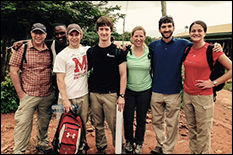Engineers Without Borders Addresses Power Needs for Ghana High School
On Aug. 1, 2015, a team of five students and one advisor from the University of Maryland chapter of Engineers Without Borders (EWB-UMD) traveled to Suma Ahenkro, Ghana, to install the first part of a 3 kW photovalic power system to improve access to electricity for Sumaman Senior High School. Currently, the school suffers power outages averaging six to 10 hours each day. While in Ghana, the EWB-UMD team sourced materials, met with in-country contacts, and began construction of the system. Community members also played an integral role in the project launch by working with EWB-UMD personnel to help secure the school’s roof, construct a battery rack to hold thousands of pounds of weight, and assemble a test solar panel mounting rack. In the months prior to the trip, students on the EWB-UMD Ghana project team designed a grid-zero solar panel system to power two classroom blocks on the campus of Sumaman Senior High School. The August Ghana travel team consisted of project leader Nick Lutschaunig (Government and Politics), education lead Christina Krueger (Mechanical Engineering), lead health and safety officer Bryce Meadows (Mechanical Engineering), monitoring and evaluation lead Sarah Niezelski (Mechanical Engineering, Economics), Brendan Dwyer (Mechanical Engineering), and advisor Bryan Quinn, Director of Technical Operations for the Department of Electrical and Computer Engineering. The trip was made possible by the guidance of faculty and professional mentors, as well as the generous support received from the Weissberg Foundation and St. Margaret’s Episcopal Church in Annapolis, Md. The University of Maryland chapter of Engineers Without Borders extends its gratitude to the Foundation and the church for their roles in effecting positive change in the Suma Ahenkro community. EWB-UMD also thanks the staff of partnering nonprofit Changing Lives Together for coordinating much of the team’s in-country logistics. EWB-UMD plans to send another team to Ghana in January 2016 to finish the implementation and assess the area for a new project. During the fall semester, students will practice construction and wiring techniques to be used on-site in the winter.
Related Articles: September 22, 2015 Prev Next |


